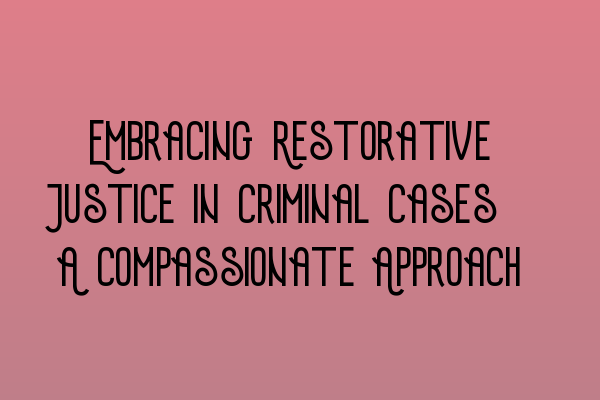Embracing Restorative Justice in Criminal Cases: A Compassionate Approach
At SQE Criminal Law & Practice Law UK, we believe in adopting a forward-thinking approach to criminal justice. One such approach that has garnered significant attention and support is restorative justice.
Restorative justice focuses on healing the harm caused by the criminal offense through meaningful dialogue between the responsible party, the victim, and the community. Instead of merely punishing the offender, restorative justice aims to repair the social fabric that has been torn apart by the commission of a crime.
By fostering empathy, accountability, and rehabilitation, restorative justice offers a compassionate alternative to traditional punitive measures. It seeks to address the root causes of criminal behavior, promote understanding, and facilitate the healing process for all parties involved.
The Benefits of Restorative Justice
Restorative justice offers several benefits that make it a preferable approach in certain criminal cases:
- Victim Empowerment: Restorative justice empowers victims by giving them a voice and an opportunity to express the impact of the crime on their lives. It allows victims to obtain answers, seek closure, and actively participate in the resolution process.
- Offender Accountability: Through face-to-face meetings between the offender and the victim, restorative justice encourages the offender to take responsibility for their actions. This individualized approach aims to help offenders understand the consequences of their behavior and develop empathy.
- Community Engagement: Restorative justice involves the community in the resolution process, fostering a sense of belonging and collective responsibility. By addressing the harm caused within the community, it promotes healing and helps prevent further offenses.
- Reduced Recidivism: Studies have shown that restorative justice programs have lower rates of recidivism compared to traditional punitive approaches. By focusing on rehabilitation and addressing the underlying causes of criminal behavior, restorative justice aims to break the cycle of re-offending.
Implementing Restorative Justice
While restorative justice has gained recognition and support, its successful implementation requires careful planning, collaboration, and training:
- Training: Legal professionals, including solicitors, judges, and probation officers, should receive specialized training in restorative justice principles and practices. This training will equip them with the necessary skills to facilitate the dialogue process effectively.
- Community Partnerships: Building strong partnerships with community organizations, victim support services, and restorative justice practitioners is crucial for the successful implementation of restorative justice programs. Collaborative efforts can ensure access to resources, expertise, and support for all parties involved.
- Legislation and Policy Support: Governments and legal bodies need to recognize the value of restorative justice and create legislation and policies that support its implementation. This includes providing funding, establishing standards and guidelines, and integrating restorative justice practices into the legal system.
- Public Awareness and Education: Promoting public awareness and educating the community about restorative justice is essential to challenge misconceptions and build trust in its effectiveness. Sharing success stories, conducting workshops, and engaging with schools and universities can help create a culture that embraces restorative justice.
Embracing a Compassionate Future
By adopting restorative justice practices, we can foster a more compassionate and inclusive criminal justice system. Restorative justice allows us to prioritize healing, rehabilitation, and accountability, providing an alternative to the retributive model that has long prevailed.
At SQE Criminal Law & Practice Law UK, we are dedicated to exploring innovative approaches to criminal law and promoting the principles of restorative justice. We believe in the power of dialogue, empathy, and rehabilitation to create a safer and more just society.
To learn more about legal representation and other legal matters, please visit our related articles:
- Legal Representation for Delaware LLCs in the UK: Expert Advice
- Ensuring Ethical Business Practices: Delaware’s Code of Conduct
- Legal Challenges for UK Businesses in the U.S.: Strategies for Overcoming Hurdles
- UK Criminal Law: An In-Depth Analysis of the British Legal System
- Legal Challenges for UK Businesses in the U.S.: Strategies for Overcoming Hurdles
